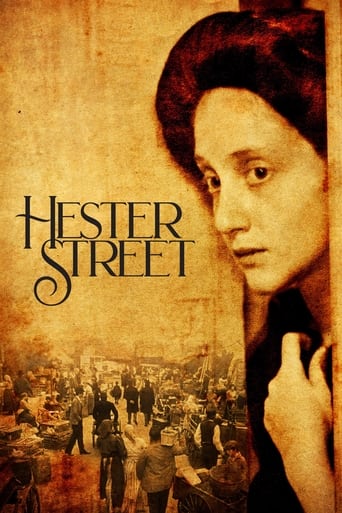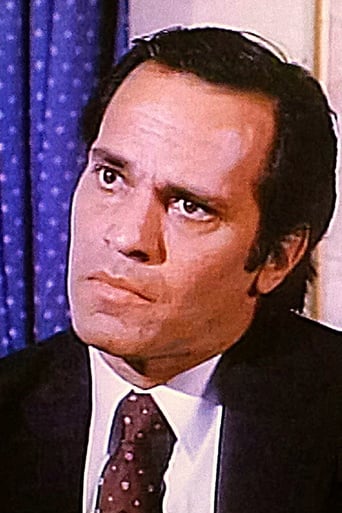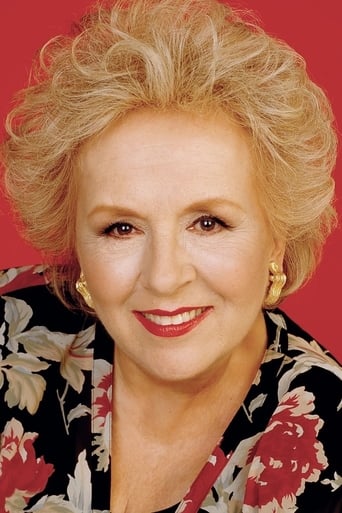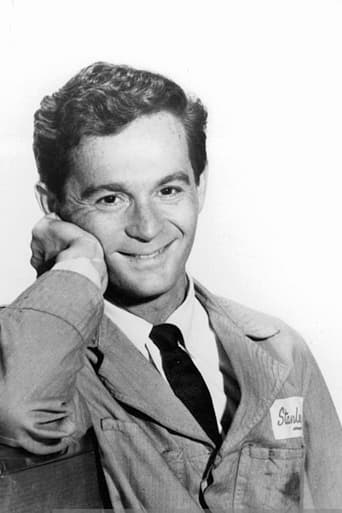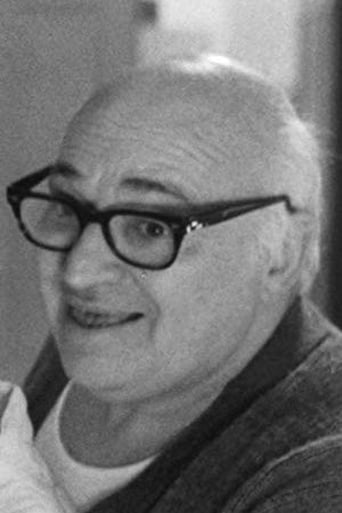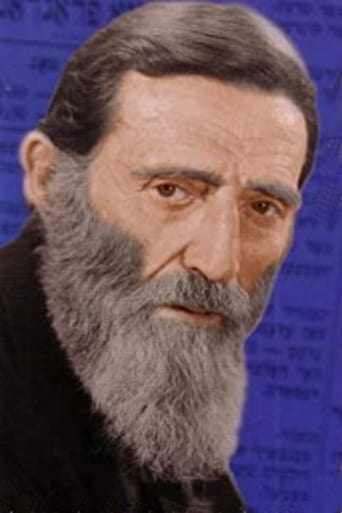Hayden Kane
There is, somehow, an interesting story here, as well as some good acting. There are also some good scenes
Izzy Adkins
The movie is surprisingly subdued in its pacing, its characterizations, and its go-for-broke sensibilities.
Nicole
I enjoyed watching this film and would recommend other to give it a try , (as I am) but this movie, although enjoyable to watch due to the better than average acting fails to add anything new to its storyline that is all too familiar to these types of movies.
Cassandra
Story: It's very simple but honestly that is fine.
lasttimeisaw
Joan Micklin Silver is an unheralded, enterprising US indie filmmaking, a pathfinder for women daring to break the glass-ceiling in the probably most sexist post in the film industry. Her debut feature, produced by her late husband Raphael D. Silver, is based on Abraham Cahan's 1896 novella, an exclusively Jewish tale about immigrants who come to Lower East Side of NYC, and their acclimatisation of a new life in the land of hope, where the collisions of culture, religion and moral codes escalate attendantly.Jake (Keats), whose yiddish name is Yankle, is a young Ashkenazi Jew from Russia, assimilates himself to the American lifestyle quite smoothly, staying in a tiny room on the titular street in Manhattan and earning his living as a seamster, he hooks up with a single dancer Mamie (Kavanaugh), who is also a Jewish immigrant, in a dancing ball during the opening sequences, where the vintage tactility honed up amazingly by Black-and-White graininess and yesteryear finesse, instantly charms and attracts viewers as a comedy skit from the silent era.Jake is rakish, all spruced up, he is determined to erase his ethnic traces and aims to be a real Yankee, proudly. Through his impertinent jokes about a greenhorn, Silver seems to inform us, he is not a character we should show a certain amount of appreciation. Steven Keats comes into his own to characterise a stomach-churning impression defies any sympathy.Jake's carefree bachelor days are over once his wife Gitl (Kane, who was Oscar-nominated for her brilliant calibre in seething intensity trapped inside a serene mound, and it is one of the most inspiring nominations accredited to the often publicity-steered Academy) arrives with their son Yossele (Freedman), whose name is changed to Joey under his insistence. In order to provide a place for the family reunion, Jake borrows Mamie's savings with an unwittingly false promise, and takes his co-worker, a bookish bachelor Mr. Bernstein (Howard) as a room to split the expense.Gitl is a beautiful, unassuming and sensible girl, in everyone's eyes, she is the perfect wife should be cherished by her husband, especially to the neighbour Mrs. Kavarsky (the late Doris Roberts, thrust by her spitfire probity), her stalwart protector. But not for Jake, Gitl represents everything he is eager to jettison, their conjugal bond is flimsy with Mamie hovers around under the pretext of collecting her money. It always takes two to tango, at this step, if Mamie still wants Jake, and is willing to help him get out of the marriage, what else can we say? They truly deserve each other.On the other hand, Gitl and Mr. Bernstein finds some kindred spirits under the aegis of Silver's tender characterisation confined in their cramped apartment. The third act can be captioned as "a divorce: Jewish style", improbably farcical thanks to the committed recreation of the scenario. Don't expect Gitl to relent under the influence of sentimentality or for the old time's sake, she might be a shrinking violet but never stupid, Jake is good-for-nothing, but at least, he has the knack to provide a handsome alimony for jilting his family.HESTER STREET superbly overreaches its ethnographic demography and it is not merely a film for Jews only as it has been merchandised since its self-sustained distribution, in the eyes of a local Chinese who has never been to America or familiar with Jewish culture, the film enchants, seduces and competently relishes in a woman's self-reliant awakening in a foreign land, moreover, it teaches an edifying lesson about how important to preserve one's own distinctive traits without becoming homogeneous. Surely, it is a humdinger of a greenhorn's debut enterprise.
Scott Amundsen
Director Joan Micklin Silver's first full-length feature film, HESTER STREET is an utterly beguiling and absorbing tale of a Russian Jewish family and the trials and tribulations that they face upon emigrating to America.We start with Jake (Americanized version of Yankel), the husband and father (Steven Keats), who like so many, came ahead of his wife and son to get himself established. Jake is a determined assimilationist; he tries without success to throw off his accent, shaves off his beard, and goes about with his head uncovered, all of which would have been shocking for a Jew in the Old Country, but in the United States, the people have the freedom to pick and choose.I don't remember how long Jake has been in the USA before his family finally get there, but it's long enough for him to form a passionate attachment to Mamie (Dorrie Kavanaugh), a broad on the make who manipulates him shamelessly because she can. He also has a boarder: Mr Bernstein (Mel Howard), who unlike Jake, is distrustful of shedding the old ways and harbors a secret desire to be a Torah scholar.Jake's wife Gitl (Carol Kane in a stunning performance) and son Yossele (Paul Freedman) finally arrive in New York, and to put it mildly, Jake is somewhat less than thrilled at the reunion with his wife. When she introduces him to his son using his Yiddish name, Jake reacts violently and informs her that in America his son's name is Joey. Gitl, overwhelmed and confused, says nothing.The rest of the film charts both Gitl's attempts to assimilate and the gradual disintegration of her marriage. In their first scene together in their apartment, he angrily informs her that no one wears wigs in America. She tries to compromise by switching to a kerchief, but he bellows at her that that is no good either. Gitl realizes, much to her horror, that he expects her to go about "with my own hair;" something a married woman would never do.Gitl is not without allies. Bernstein rather obviously falls in love with her early on, and she is helped with her assimilation process by Mrs Kavarsky (the great Doris Roberts), a jolly sort who dresses as she pleases and goes about with her head uncovered and is not the least bit afraid of Jake; in fact she goes after him on a couple of occasions, the most poignant of these being the moment when Gitl shyly shows herself to him with her own hair neatly styled, and he reacts as if she were a streetwalker. Mrs Kavarsky gives him the rough edge of her tongue in an extended rant that he does not dare to stand up to; at bottom, Jake is a bully and a coward, wanting nothing more than to rid himself of his wife, whom he no longer loves, so that he can take up with Mamie.Meantime, Gitl, shy though she may be, is no fool; she picks up enough English to get by, and is aware of Bernstein's admiration of her fairly early on. She remains polite to him, even kind, encouraging him to study Torah if that is what he wants, but maintaining the distance between them as a married woman should.Until one day when Jake finally pushes Gitl over the edge and she decides to divorce him. Even the inequity of the divorce ritual is well-documented here; Gitl may not marry for ninety-one days from the divorce, whereas Jake could marry that same day if he had a mind to.The ending is funny, sad, happy, and ironic all at once, as Gitl and Bernstein walk off together in one direction and Jake and Mamie in another. Gitl and Bernstein are radiant; Mamie is smugly triumphant, but Jake is already beginning to realize that he may have made a terrible mistake. But he has been such an out-and-out bastard to his wife that one can't help laughing at the irony of the trap he is in, a trap of his own making.The acting is exquisite; there is not a single false note in this film, which is especially impressive since the actors had to work in both English and Yiddish. The entire cast is wonderful, but Carol Kane in particular shines here. Kane's best feature has always been her deep, expressive eyes, and she communicates volumes with them, as Gitl moves from being a submissive, Old Country wife subject to the whim of her husband to a woman of self-confidence who finds love with a man who also respects her.This is a beautiful little film; every moment rings absolutely true. A stunning debut for Silver.
Al Rodbell
Around 1975 I saw this movie with my mother and aunt, born in 1902 and 1903 respectively. They watched it as if it were a replay of a life that they had known, having come to this country just about the time of the characters on the screen.My mother soon descended into the long goodbye of Alzheimers disease. So this is a memory I especially value. My Aunt, kenehora, is still with us. They discussed it mater of factly, not so much as a work of art, but a documentary. I can think of no greater compliment to all who were involved in creating this very special film.Al Rodbell
moonspinner55
Carol Kane never really found her niche in the movies--only when she switched to sitcoms did her googly-eyed craziness really come off. But in 1975, before we'd gotten used to her comic bravado, she turned in a lovely, Oscar-nominated portrayal of an immigrant Russian Jew in New York that still stuns, even today. Quiet emotions permeate this careful, low-budget, somewhat slight film set on New York's East Side in 1896. Writer-director Joan Micklin Silver has a genuinely sly eye for detail that results in some amusing moments, but for the most part it's a human drama in a thoughtful key which builds momentum as it goes along. **1/2 from ****
